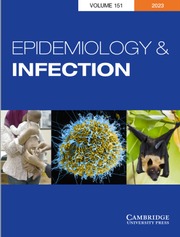Crossref Citations
This article has been cited by the following publications. This list is generated based on data provided by
Crossref.
WRAY, C.
and
ROEDER, P.L.
1987.
Effect of bovine virus diarrhoea—mucosal disease virus infection on salmonella infection in calves.
Research in Veterinary Science,
Vol. 42,
Issue. 2,
p.
213.
Wray, C.
and
McLaren, I.
1987.
A note on the effect of the lactoperoxidase systems on salmonellas in vitro and in vivo.
Journal of Applied Bacteriology,
Vol. 62,
Issue. 2,
p.
115.
Santos, Renato L.
Zhang, Shuping
Tsolis, Renée M.
Kingsley, Robert A.
Garry Adams, L.
and
Bäumler, Andreas J.
2001.
Animal models of infections: enteritis versus typhoid fever.
Microbes and Infection,
Vol. 3,
Issue. 14-15,
p.
1335.
Naughton, P.J.
and
Grant, G.
2005.
Microbial Ecology in Growing Animals.
Vol. 2,
Issue. ,
p.
235.
Quigley, J.D.
Wolfe, T.A.
and
Elsasser, T.H.
2007.
Letter to the Editor: A Response to the Comments of Borderas et al. (2007).
Journal of Dairy Science,
Vol. 90,
Issue. 8,
p.
3569.
Silva, D.G.
Silva, P.R.L.
Fagliari, J.J.
Ávila, F.A
Alessi, A.C.
and
Oliveira, R.G.
2008.
Avaliação clínica da infecção experimental de bezerros com Salmonella Dublin.
Arquivo Brasileiro de Medicina Veterinária e Zootecnia,
Vol. 60,
Issue. 1,
p.
251.
Ávila, L.G.
Silva, D.G.
Sato, R.A.
and
Fagliari, J.J.
2011.
Avaliação clínica da infecção experimental de bezerros com Salmonella Typhimurium.
Arquivo Brasileiro de Medicina Veterinária e Zootecnia,
Vol. 63,
Issue. 6,
p.
1587.
Silva, Daniela Gomes da
Silva, Péricles Ricardo Lacerda e
Silva, Paulo César da
and
Fagliari, José Jurandir
2011.
Serum protein concentrations, including acute phase proteins, in calves experimentally infected with Salmonella Dublin.
Pesquisa Veterinária Brasileira,
Vol. 31,
Issue. 7,
p.
551.
Costa, Luciana F.
Paixão, Tatiane A.
Tsolis, Renée M.
Bäumler, Andreas J.
and
Santos, Renato L.
2012.
Salmonellosis in cattle: Advantages of being an experimental model.
Research in Veterinary Science,
Vol. 93,
Issue. 1,
p.
1.
Gopinath, Smita
Carden, Sarah
and
Monack, Denise
2012.
Shedding light on Salmonella carriers.
Trends in Microbiology,
Vol. 20,
Issue. 7,
p.
320.
Nielsen, Liza Rosenbaum
Kudahl, Anne Braad
and
Østergaard, Søren
2012.
Age-structured dynamic, stochastic and mechanistic simulation model of Salmonella Dublin infection within dairy herds.
Preventive Veterinary Medicine,
Vol. 105,
Issue. 1-2,
p.
59.
Fierer, Joshua
Okamoto, Sharon
Banerjee, Ananya
Guiney, Donald G.
and
Bäumler, A. J.
2012.
Diarrhea and Colitis in Mice Require the Salmonella Pathogenicity Island 2-Encoded Secretion Function but Not SifA or Spv Effectors.
Infection and Immunity,
Vol. 80,
Issue. 10,
p.
3360.
Nielsen, Liza Rosenbaum
2013.
Review of pathogenesis and diagnostic methods of immediate relevance for epidemiology and control of Salmonella Dublin in cattle.
Veterinary Microbiology,
Vol. 162,
Issue. 1,
p.
1.
NIELSEN, L. R.
2013.
SalmonellaDublin faecal excretion probabilities in cattle with different temporal antibody profiles in 14 endemically infected dairy herds.
Epidemiology and Infection,
Vol. 141,
Issue. 9,
p.
1937.
NIELSEN, L. R.
2013.
Within-herd prevalence ofSalmonellaDublin in endemically infected dairy herds.
Epidemiology and Infection,
Vol. 141,
Issue. 10,
p.
2074.
Goodman, Laura B.
McDonough, Patrick L.
Anderson, Renee R.
Franklin-Guild, Rebecca J.
Ryan, James R.
Perkins, Gillian A.
Thachil, Anil J.
Glaser, Amy L.
and
Thompson, Belinda S.
2017.
Detection of Salmonella spp. in veterinary samples by combining selective enrichment and real-time PCR.
Journal of Veterinary Diagnostic Investigation,
Vol. 29,
Issue. 6,
p.
844.
Foster, Neil
Tang, Ying
Berchieri, Angelo
Geng, Shizhong
Jiao, Xinan
and
Barrow, Paul
2021.
Revisiting Persistent Salmonella Infection and the Carrier State: What Do We Know?.
Pathogens,
Vol. 10,
Issue. 10,
p.
1299.
Henderson, Katrina
Mason, Colin
Brülisauer, Franz
and
Williams, Paul
2022.
Determining the prevalence of antibodies to Salmonella Dublin in dairy herds in Great Britain by quarterly bulk tank testing.
Preventive Veterinary Medicine,
Vol. 208,
Issue. ,
p.
105776.
Delling, Cora
and
Daugschies, Arwid
2022.
Literature Review: Coinfection in Young Ruminant Livestock—Cryptosporidium spp. and Its Companions.
Pathogens,
Vol. 11,
Issue. 1,
p.
103.
Perry, K.V.
Kelton, D.F.
Dufour, S.
Miltenburg, C.
Umana Sedo, S.G.
and
Renaud, D.L.
2023.
Risk factors for Salmonella Dublin on dairy farms in Ontario, Canada.
Journal of Dairy Science,
Vol. 106,
Issue. 12,
p.
9426.


